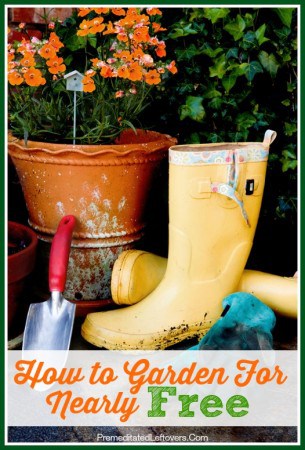It is not a secret that gardening can be very rewarding and save you money, especially if you grow vegetables. For some people, though, the amount of money it takes to invest in a gardening hobby can be enough to scare them off. Here are some tips for gardening that can make it almost free to do.
How to Garden for Nearly Free
Call your local dump for free compost. Many larger cities compost the yard waste they get in the fall and spring and let people take as much as they want for free. This soil is often rich in nutrients and is a great way to get your garden off to a good start, especially if you don’t already have a compost of your own.
Use “free” water instead of running up your water bill. Save water that comes from rain in barrels and that you use for things like doing the dishes (as long as you don’t use harsh chemicals like bleach) and water your garden with that.
Check in your community for a tool lending “library”. Many communities have local organizations that help people with low income or any income level be able to do things such as home improvement and gardening. You might be surprised to find out that some of these places even let you borrow expensive equipment for free.
Use garbage to fertilize and keep away pests. The things you generally toss in the garbage are often good for keeping out pests big and small as well as making your soil rich. Did you know orange peels work as a great fertilizer and to keep neighborhood cats out of your vegetable beds?
If you don’t mind used stuff, look on sites like Craigslist and Freecycle for giveaways that are useful. You may find not only free tools, but also things that can be turned into gardening structures like metal bed-frames, old tires and old furniture. There are also a lot of free wooden pallets on sites like this and just a quick look on Pinterest and you can find all sorts of gardening projects these can be useful for.
For seeds, you can often trade online. Go to websites that offer gardening advice and see if they have a forum for discussion. There will often be a section where people giveaway or trade their heirloom seeds and many gardeners are happy to help a newbie get started.
If space is an issue, see if your area has a community garden. Many times, the spot is free as long as you volunteer your time to helping weed and get the ground ready for fall and for spring planting.
If the idea of starting plants from seeds worries you or you don’t have time, ask for free seedlings. You can usually get them for free or super cheap by asking for the throw-aways from nurseries or co-ops for farmers.
Re-grow plants from ones you bought already harvested. Did you know many plants like green onions, celery and some kinds of lettuce can regrow as long as the roots are still attached? Just stick the roots on shallow water and allow them to regenerate. When you have good roots growing, plant them in the ground for a second round.
What other tips do you have for gardening for nearly free?


Candi says
Great tips – Even if you buy your seeds, starting plants from seeds is quite close to a free garden.
I know many folks may be skeptical, but you really can find free compost and grow your own food.
Not only is it affordable and cheap – it’s fun too!
tee says
Your pics remind me that all sorts of waste things can be used for planters, containers, watering jugs, composters, and plant labels. use clear clam shell plastic bakery containers to start seeds in a mini green house. A well rinsed huge fabric softener jug is for watering, smaller plastics are labelled for concentrated nutrients. Yogurt cups with added holes can be small plant pots, water bottles with a few small holes can be pushed into the soil for slow release water at the roots. Huge plastic drums from food service are great for rainbarrels or compost barrels or dog houses. Thrift store small household trash cans can be plant pots. Cut up milk jugs into stakes for marking plant rows. Strips from mylar balloons can be tied to stakes to shoo birds.
Deborah says
GREAT thoughts! We are really needing to start our garden in our new to us home. These are wonderful ideas to help do it on a dime (or no dime at all)! Just as an FYI, some communities, that don’t have a lot of water, don’t allow you to collect rain water. I think Colorado you can’t do and some other areas as well. In WA, you probably don’t have any problem 🙂